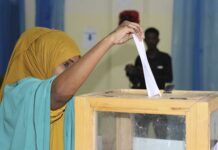On 14 April 2014, 276 girls were kidnapped from their boarding school in Chibok, Nigeria, by the terrorist group Boko Haram. It has been a year since the abductions and, despite social media campaigns and calls from the Nigerian government and world leaders for Boko Haram to return them, most of the girls are still being held captive. On Wednesday, commemorative ceremonies were held across the world to mark their anniversary of the kidnappings. PONTSHO PILANE and FATIMA MOOSA attended a solidarity march organised by Wits University’s media studies department and asked students and staff about the campaign.
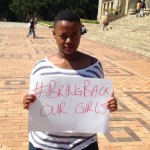
I was part of the march because I have noticed that attention has diverted from the Chibok girls and nobody thinks it matters anymore. The girls have still not been found and I think it is important to remember that – especially now with the Garissa shootings happening just recently. This helps raise awareness and it keeps reaching people and reminding them that this is a serious issue that we cannot simply just forget. The #BringBackOurGirls hashtag played a very significant role in making the world aware about the abductions – it has also showed a sense of global community. The continuous campaigning also puts pressure on the government, which has been very complacent in getting the girls back. I think the government can do more than they have done so far.
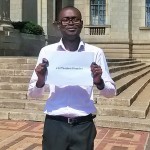
I am here to show solidarity and create awareness that more than 200 girls are still missing and we cannot just forget about them. There is a need to make the governments – both the Nigerian government and the international leaders – do more to help rescue the girls. I’m also here to show support for the families of the students that were killed in Kenya and to say no to senseless killings. Our governments must do more to protect lives and provide necessary security. I was actually excited because I saw people looking at the different hashtags on the placards we were carrying. As a Nigerian working here in South Africa, I am currently researching the #BringBackOurGirls campaign. I check the hashtag every day to see the extent to which a social media movement such as this one has been able to engage and pressure the Nigerian government and the international community to help with rescuing the kidnapped girls.
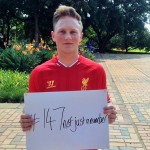
The march is significant to me because it is happening on the first anniversary of the girls’ abduction. Terrorism and crimes against humanity, especially women and children, are so prevalent in our society and I came here to stand in solidarity against this. Commemorative events such as these are important because people may have forgotten about the abductions and this will serve as a painful reminder of that fact. People saw us march around Wits and this made them curious, which is all the march is about – stating that we have not forgotten about the girls. If the Nigerian government is doing enough to get the girls back then the girls would be back already. It has been a year already and nothing effective has been done by the government. We cannot deny the role of social media in keeping the campaign relevant and on the minds of people. As soon as there was bigger news to cover mainstream media neglected the campaign – but social media kept it alive.
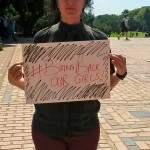
I am here in solidarity with my colleagues from Kenya and Nigeria in order to commemorate the abduction of the Nigerian school girls exactly a year ago. We felt it would be important as a group, as colleagues, as a community to just remember what happened and to come together and share that memory with others. We’re not looking for major impacts – it’s in order for us to work together as a community and to be able to express our feelings and to do it here in a public space. I don’t know enough about what’s been done by the Nigerian government to comment, but I think more of a strategic intervention is required. Seems like not enough has been done and the only thing that can save those girls are the government types of intervention.
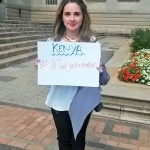
I have a strong, deep emotion for the girls that were taken and I think as a media studies student it is important we stand for what we believe in and make a difference – even through solidarity. There weren’t many people at the march, but just this group shows there is a voice being heard and there are people who do care, and it shows the other people in other university departments what is going on. I have been following the hashtag through the various social-media platforms and it is an issue I take seriously. I think the world obviously can’t have a direct impact because they don’t have a say in what the Nigerian government does, but I think by creating more awareness, through the hashtag and marches such as these, it will push the government to do something more drastic.
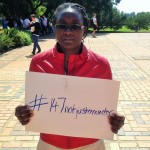
It is important to talk about how we feel, as students and as teachers, about how terrorists and terrorism affects society. I am here to not only show my support but to publicly show my views on these violations, because it can happen to us as well. I hope this is the beginning of a bigger movement for the years to come and that this day is not forgotten. One of the things that has driven the campaign is the hashtag on social media and it has showed the humanity of the internet, which can be a very ruthless place sometimes. People have reached out and engaged with the plight of these girls. There should be less talk and more doing – we are not hearing enough from governments about strategies to actively get the girls back. There is a lot of lip-service and not enough action.

![BBOG Wits march resized [slider]](https://www.thedailyvox.co.za/wp-content/uploads/2015/04/BBOG-Wits-march-resized-slider.jpg)

